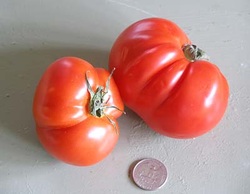 Two Real Tomatoes, perhaps on their
Two Real Tomatoes, perhaps on their silver anniversary.
Perhaps you have had a garden. Gardeners take supreme delight in their tomatoes. One of life’s greatest satisfactions is to pick a few garden tomatoes, if you can get home for lunch, and cut them up for sandwich or salad. Just a few wedges of freshly-picked tomatoes, with a drop of olive oil and a pinch of salt, maybe a sprinkling of pepper and a splash of balsamic vinegar. The taste is real. It has heart. Food in Italy tastes so good because they use garden tomatoes rather than the mass-produced things we pick green and spray with ethylene gas to look ripe. These
“tomatoes” are generally tasteless and textureless and they don’t even smell like tomatoes.
But what if an entire generation grew up knowing no tomato but this plastic kind of “tomato?” They would not know what real tomatoes tasted like, looked like, smelled like or felt like. I suppose, in a way, you can call those plasticky, reddish, hard round balls “tomatoes,” but they are almost nothing like what you pluck from real, living, pungent tomato vines. Plastic tomatoes, plastic marriage. We’ve artificially manufactured a new kind of “tomato,” and we’ve artificially manufactured a new kind of “marriage” that does what we want it to. But there’s one problem: it’s not natural, and it doesn’t taste good.
The savor of marriage comes precisely from its difficulties, heroically overcome by spouses who learn, gradually, to give rather than to take, to accept rather than to manipulate, to receive rather than to demand. Ever wonder why the homosexual movement demands what it wants like a spoiled child? It’s because its members are not married. They have not learned to accept that you can’t put a round peg into a square hole. They are used to forcing nature. But our marriage problems began with artificial contraception, which unnaturally forces nature. They got worse when we began giving up on lifelong marriage. Now, please understand me: I’m talking about social trends. Many people have nobly sustained divorce and heroically rebuilt fine human lives from the wreckage. But as a culture, we’ve lost the nerve required to sustain lifelong married love.
Marriage is lifelong because it takes an entire lifetime to become a good person. We only learn to love another gradually, over the years, through trials and errors. Marriage forces people to mature, and without it we are a peevish, inconstant, selfish people. Yes, marriage has always been difficult, and folks have always cheated by having affairs with secret lovers and letting themselves devolve into the “married singles” lifestyle. But we’ve never come to a point of denying the goodness of marriage itself. Until now, perhaps. In the last fifty years personal wealth and security have increased to the degree that we can afford divorce. In years past, folks just couldn’t come up with the tens of thousands of dollars for divorce lawyers and therapists and setting up a second household. So they stayed married, and they worked things out, or learned to live with disappointment. If things were really bad, they divorced, but they didn’t deny marriage itself.
But we have done that, over the last fifty years. An entire generation or two has grown up with a tasteless, savorless, cheap imitation of “marriage” in America. Mostly what we have seen since 1968 is superficial, egotistical, confrontational relationships—on TV, in movies, among friends, and at home. We’ve grown up with a plastic imitation of marriage. How would anyone who knew nothing but “Love American Style” know what real marriage looks like, smells like, feels like? So when the totalitarians of culture tell them gay “marriage” is marriage, they say: “I guess so.”
But real tomatoes taste better, and so does real marriage. We can settle for plastic tomatoes, and we can settle for artificial marriage, but at some point, I suppose, we’ll get sick of it. We will make the sacrifices necessary to grow and ship and buy real tomatoes. And we will do the same with marriage. There comes a time when you just won’t settle for cheap imitations anymore. You plant real vines, and hoe around them, and weed, and water, and sacrifice, because you want a real tomato.


 RSS Feed
RSS Feed